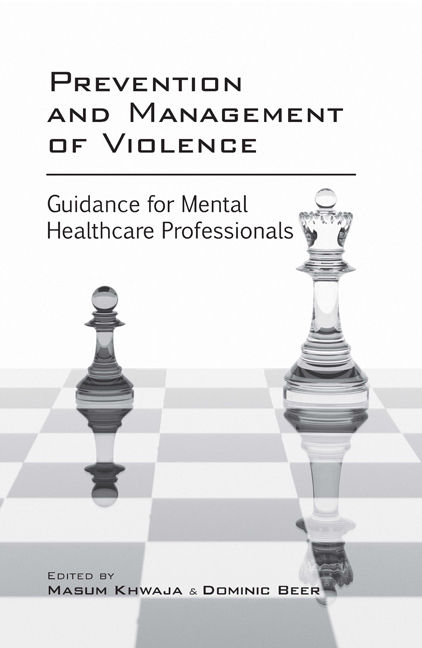Book contents
- Frontmatter
- Dedication
- Contents
- Abbreviations
- List of boxes and tables
- Working group
- Executive summary and recommendations
- 1 Legislation relevant to the management of violence by persons with mental disorders
- 2 Safeguarding vulnerable adults and children exposed to violence
- 3 Risk assessment and management
- 4 Risk prevention and non-pharmacological management of violence in acute settings
- 5 Use of medication and ECT in the management of violence
- 6 Post-incident management
- 7 Management of the risk of violence in the community
- 8 Management of violence in older adults
- 9 Management of violence in people with intellectual disability
- 10 Management of violence in prisons
- 11 Liaison with the police, Crown Prosecution Service and MAPPA
- 12 Information-sharing with victims of crime committed by persons with mental disorders
- 13 Clinical governance
- Appendix Organisations that victims of crime can contact
- Index
5 - Use of medication and ECT in the management of violence
- Frontmatter
- Dedication
- Contents
- Abbreviations
- List of boxes and tables
- Working group
- Executive summary and recommendations
- 1 Legislation relevant to the management of violence by persons with mental disorders
- 2 Safeguarding vulnerable adults and children exposed to violence
- 3 Risk assessment and management
- 4 Risk prevention and non-pharmacological management of violence in acute settings
- 5 Use of medication and ECT in the management of violence
- 6 Post-incident management
- 7 Management of the risk of violence in the community
- 8 Management of violence in older adults
- 9 Management of violence in people with intellectual disability
- 10 Management of violence in prisons
- 11 Liaison with the police, Crown Prosecution Service and MAPPA
- 12 Information-sharing with victims of crime committed by persons with mental disorders
- 13 Clinical governance
- Appendix Organisations that victims of crime can contact
- Index
Summary
Our guidance will focus on the use of medication as an emergency response – i.e. rapid tranquillisation – but we will also briefly discuss the use of medication in the management of the risk of violence in the medium to longer term. We suggest that our guidance is read in conjunction with the 2005 NICE guidelines.
General principles for prescribing medication to prevent or control violence
The use of medication in the control of violence is only one part of a comprehensive treatment plan to manage the risk of violence that includes an assessment of environmental factors and the use of other therapies.
Medication should not be used to manage aggression caused by identifiable environmental factors (such as understaffing or lack of staff skills) that can be dealt with by other means.
Good practice principles in prescribing medication to prevent or control violence include the list below.
• Medication should only be used when the risk of not using medication is judged to be greater than that arising from its use.
• The indication for which any pro re nata (p.r.n.) medication is prescribed should be clearly stated.
• The lowest dose compatible with effective treatment should be used.
• The dose prescribed should be individually tailored for each patient; for example, older patients generally require lower doses of antipsychotic medication, and comorbid physical disorders and concomitant medication may influence the dose (and type) of medication prescribed.
• The choice of medication used should also be individually tailored to the patient and informed by a knowledge of their psychiatric and medical history, mental and physical state, treatment history, any existing advanced directive, and after an attempt has been made to establish a provisional diagnosis.
• As few medicines as possible should be used.
• The use of combinations from the same class of medicine is often unnecessary and should be avoided if possible.
• Patients should be regularly monitored for side-effects of medication, and both regular and as required (p.r.n.) medication should be reviewed on a regular basis.
• If there is evidence that the medicines prescribed are unnecessary or ineffective then they should be reduced and discontinued.
• The use of medicines outside their licence, or above maximum recommended dosage (either alone or in combination), is the responsibility of the individual practitioner who should undertake the recommended safeguards in relation to documentation of indications and consent.
- Type
- Chapter
- Information
- Prevention and Management of ViolenceGuidance for Mental Health Professionals, pp. 35 - 62Publisher: Royal College of PsychiatristsFirst published in: 2017



